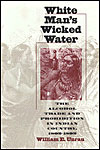 |
White Man's Wicked Water
The Alcohol Trade and Prohibition in Indian Country, 1802-1892
In White Man's Wicked Water William Unrau tells the compelling story of how an alcohol-sodden society introduced drink to the Indians. That same society then instituted futile policies to control the flow of alcohol to tribes who, as one superintendent put it, "have not the moral force to resist temptation". Unrau dispels that racial-deficiency theory and debunks the belief that prohibition was carried out by well-intended reformers. Scholars have often viewed the sale of alcohol to Native Americans as a ploy by Euro-Americans to trick them into unfair land and trade deals. But Unrau makes it clear that alcoholic consumption by Native Americans was the inevitable consequence of cultural confluence, not of conscious white subversion. Indian inebriation in the nineteenth century, he shows, essentially mimicked the habits of white Americans who - spurred on by prevailing attitudes and federal law - were aspiring to integrate the natives into the cultural mainstream.
180 pp ~ illustrated — ©1996
|

